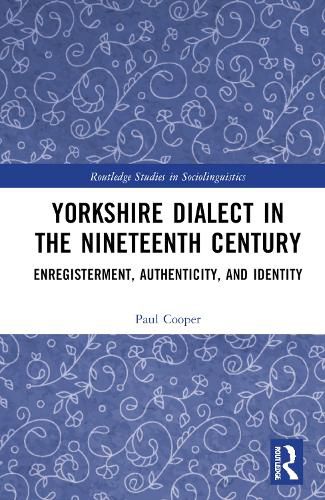Readings Newsletter
Become a Readings Member to make your shopping experience even easier.
Sign in or sign up for free!
You’re not far away from qualifying for FREE standard shipping within Australia
You’ve qualified for FREE standard shipping within Australia
The cart is loading…






This book draws on a framework of enregisterment and indexicality to chart the ways in which the Yorkshire dialect came to be associated with particular linguistic repertoires and social stereotypes from the nineteenth century through to today. Cooper situates the work within a historical enregisterment framework, rooted in an ideological approach to the study of language.
Focusing on representations of the Yorkshire dialect in a corpus of 19th century writing, comprising poetry, ballads, songs, and plays, Cooper explores how the dialect came to be enregistered and indexical of social values such as friendliness, directness, or authenticity, and how sub-varieties impacted the division of communities along ideological lines. The volume also includes qualitative analyses of metalinguistic commentary from such historical sources as dictionaries, glossaries, and magazines. Taken together, the book offers a holistic picture of the evolution of the Yorkshire dialect and in turn, stereotypes of "Yorkshireness" which persist to this day. Cooper shows how an enregisterment approach can offer a deeper understanding of the historical relationships between dialect and identity and in turn, contemporary perceptions of dialects and their speakers.
This volume will be of interest to students and scholars in historical sociolinguistics, dialectology, and English language.
$9.00 standard shipping within Australia
FREE standard shipping within Australia for orders over $100.00
Express & International shipping calculated at checkout
This book draws on a framework of enregisterment and indexicality to chart the ways in which the Yorkshire dialect came to be associated with particular linguistic repertoires and social stereotypes from the nineteenth century through to today. Cooper situates the work within a historical enregisterment framework, rooted in an ideological approach to the study of language.
Focusing on representations of the Yorkshire dialect in a corpus of 19th century writing, comprising poetry, ballads, songs, and plays, Cooper explores how the dialect came to be enregistered and indexical of social values such as friendliness, directness, or authenticity, and how sub-varieties impacted the division of communities along ideological lines. The volume also includes qualitative analyses of metalinguistic commentary from such historical sources as dictionaries, glossaries, and magazines. Taken together, the book offers a holistic picture of the evolution of the Yorkshire dialect and in turn, stereotypes of "Yorkshireness" which persist to this day. Cooper shows how an enregisterment approach can offer a deeper understanding of the historical relationships between dialect and identity and in turn, contemporary perceptions of dialects and their speakers.
This volume will be of interest to students and scholars in historical sociolinguistics, dialectology, and English language.